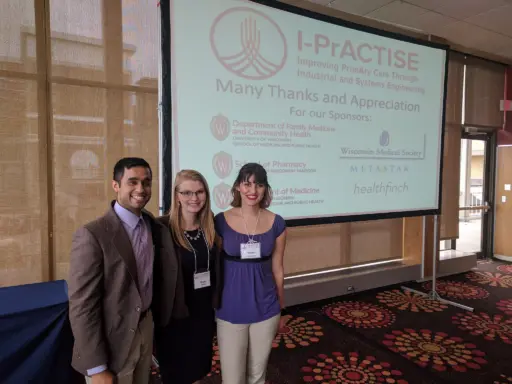In April 2017, several students mentored by Industrial and Systems Engineering (ISyE) Assistant Professor Nicole Werner were among hundreds of undergraduates who participated in the 19th annual University of Wisconsin-Madison Undergraduate Research Symposium. One student team also presented their work at the Improving Primary Care Through Industrial and Systems Engineering (I-PrACTISE) conference hosted by ISyE and the Departments of Family Medicine and Community Health, Medicine, and Pediatrics.
At both events, Rachel Zenker, a junior in ISyE, and Connor Pardell, an MBA student in the Wisconsin School of Business, presented their analysis of the burdens experienced by informal (unpaid, nonprofessional) caregivers of about 5.3 million patients diagnosed with Alzheimer’s disease or related dementias. These caregivers invest an estimated 18 billion hours of work per year, at a price tag of up to $218 billion in caregiving costs, lost productivity, medical and institutional care. The students interviewed nine informal caregivers to develop a better understanding of their typical workload and daily challenges. This insight will inform the next step of designing a technology-based support system targeted to this audience.
 The I-PrACTISE challenge team (from left to right: Sai Suraj Kandukuri, Rachel Zenker, Nadia Doutcheva) received an honorable mention award. Photo provided by R. Zenker.
The I-PrACTISE challenge team (from left to right: Sai Suraj Kandukuri, Rachel Zenker, Nadia Doutcheva) received an honorable mention award. Photo provided by R. Zenker.
For the commercialization potential of this innovative support system, Zenker won a cash prize called the Undergraduate Discovery to Product (D2P) Commercialization Award.
Tom Martell, who is pursuing an ISyE master’s degree, and Anna Fulton Jolliff, who is enrolled in a counseling psychology master’s program, presented a design project focused on personal health information management. From interviews and virtual home observations, the students learned how patients personalize their home environment, including available technology and data storage tools, to manage their health information while meeting their needs for privacy and security. Since the process can be burdensome, the students hope to design a secure and easy-to-use health information management system that incorporates what they have learned about the patients’ needs and interests.
Michelle Tong, a senior in biomedical engineering who is mentored by Werner, also studied personal health information management in the home, with a focus on patients with chronic diseases. For this audience, she identified several overarching strategies that should inform the design of consumer health IT applications, whose goal is to improve both medical outcomes and the healthcare decision-making process using electronic communication.
The research presented by Martell, Jolliff and Tong is part of the vizHOME project at the Wisconsin Institute for Discovery, which employs intensive home-based interviews and specialized imaging techniques to help design computer tools that support health practices in the home.
For I-PrACTISE, a team including Rachel Zenker; Nadia Doutcheva, who is pursuing a doctoral degree in ISyE; and Sai Suraj Kandukuri, a 2016 UW-Madison biochemistry graduate, responded to the organizers’ challenge to student participants to improve support for shared decision making.
For this task, the students chose a hypothetical 68-year-old man with diabetes, high blood pressure, osteoarthritis and depression who is considering prostate-specific antigen (PSA) screening for prostate cancer. The PSA test is controversial among clinicians: While it is simple, inexpensive and has the potential to detect a malignant tumor early enough to be treated successfully, a positive result can be misleading and result in unnecessary treatment if the tumor is benign.
In response to the organizers’ challenge, the students developed PSAid, a web-based tool for patients to verify clinical information from their electronic health record, and identify and rank their healthcare goals. The tool combines the information into a one-page personalized report that patients and their physicians review and discuss to make a shared decision about PSA screening.
Doutcheva, Kandukiri and Zenker won the Ben-Tzion Karsh 2017 Honorable Mention Award for their successful participation in the I-PrACTISE challenge.